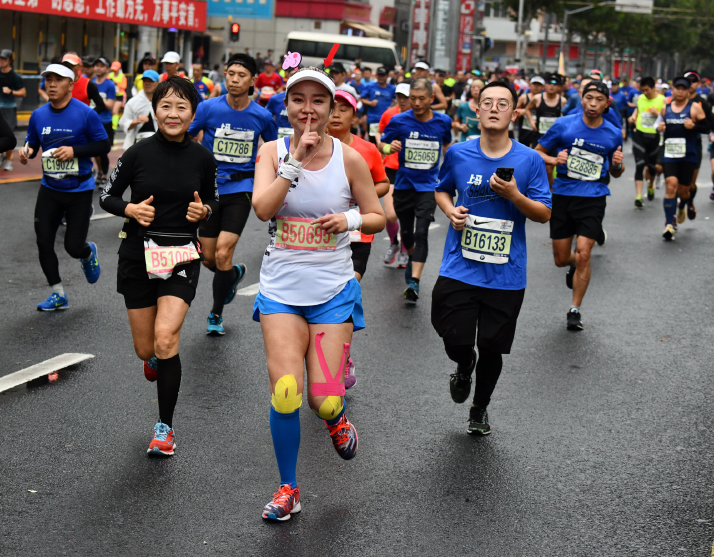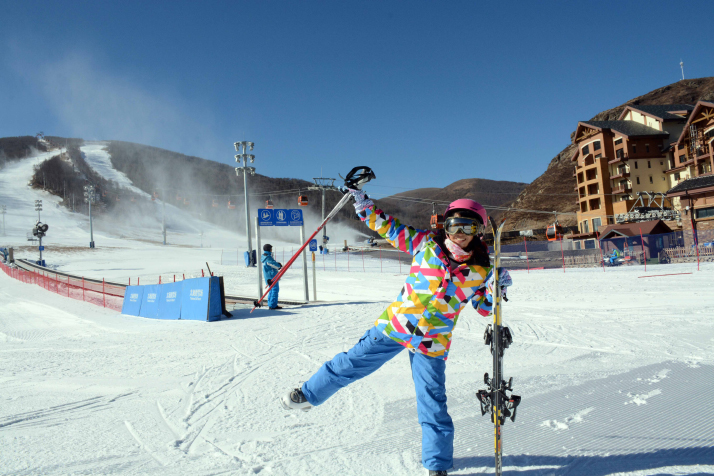|
||||||||||
| Home Nation World Business Opinion Lifestyle ChinAfrica Multimedia Columnists Documents Special Reports |
|
||||||||||
| Home Nation World Business Opinion Lifestyle ChinAfrica Multimedia Columnists Documents Special Reports |
| ChinAfrica |
| Sports and the City |
| Large-scale sports events benefit urban development, raise city profile |
| By Li Jing | VOL.11 November ·2019-11-11 |

Participants at the Shanghai International Marathon in November 2018 (XINHUA)
Over 33,000 marathon lovers gathered on the banks of Fenhe River, the second-largest tributary of the Yellow River, in the city of Taiyuan, the capital of north China's Shanxi Province, for the 2019 Taiyuan International Marathon on September 8. Two hours, 9 minutes and 43 seconds after the kickoff, Marius Kimutai, a Kenyan runner, crossed the finish line and won the men's marathon championship. Shortly after, Belainesh Yami Gurmu from Ethiopia won the women's championship with the finish time of 2:29:48. They are also the first pair of champions since the Taiyuan marathon received the gold label certification from the International Association of Athletics Federations in June 2019. Based on several criteria, road races can be labeled gold, silver or bronze. For now, there are 10 marathons labeled gold in the mainland of China, including Beijing, Xiamen and Shanghai.
According to Wang Nan, Vice President of the Chinese Athletics Association, in 2018, 1,581 road races were organized, an increase of 479, or 43.46 percent, over the previous year. Road races have become one of the favorite sports of the Chinese and more cities are organizing large-scale events.
Sports events stimulate not only national enthusiasm for the sport, but also urban development. "Modern sports started with the urbanization caused by the industrial revolution. Urbanization promoted the development of modern sports, which in turn promoted urban development," said Bao Mingxiao, Director of the China Sports Economy Research Center, at a forum on sports industry and city development in November 2017.
According to Liu Fumin, Director of the sports economics department of China's General Sports Administration, the total value of China's sports industry has risen from 1,350 billion yuan ($190 billion) in 2014 to 2,200 billion yuan ($310 billion) in 2017, with an average annual growth rate of about 18 percent, representing 0.94 percent of the GDP in 2017.
On September 17, the State Council, China's cabinet, issued a document focusing on the promotion of national fitness and sports consumption, to promote quality development of the sports sector, and stressed the importance of promoting sports as pillar industry of the national economy.

Skiing has become a new favorite sport in China ahead of the 2022 Beijing Winter Olympic Games (XINHUA)
Urban infrastructure
"The organization of large-scale sports events has a significant effect on the construction and management of infrastructure, such as urban transport, communications, and public sports facilities," claimed Mr. Bao.
During the preparations for the Beijing 2008 Summer Olympics, many facilities were built, such as the Beijing Capital International Airport Terminal 3, five subway lines, and the Beijing-Tianjin intercity train with a speed of up to 300 km/h. Then there is the main stadium called Bird's Nest, which now serves as a venue for many great concerts or other performances, the Water Cube which has become a water park, and the Olympic Forest Park which is now one of the most popular entertainment venues for Beijing residents. Eleven sites of the 2008 Olympics will also be used for the 2022 Winter Olympics.
In 2022, the 24th Olympic Winter Games will be held in Beijing, the host city, while Zhangjiakou, northwest of Beijing in Hebei Province, will be the co-organizer. All ice events will be held in Beijing, while the two cities will share snow competitions. To enable people from around the world to travel to Zhangjiakou conveniently, the Beijing-Zhangjiakou high speed railway, with a length of 174 km, will be officially inaugurated at the end 2019. The journey from Beijing to Zhangjiakou will take less than an hour.
Enhanced image
Chongli, a district of Zhangjiakou City, is gaining popularity as it is the main venue of the snow competitions of the Olympic Winter Games of 2022. Since 2015 when Beijing won the hosting right for the 2022 games, Chongli has organized many international ski competitions.
The holding of international sports events has allowed more people to know about and visit Chongli. According to statistics from the Hebei Province Culture and Tourism Department, during the 2019 Spring Festival, Hebei welcomed a total of 22 million tourists, an increase of 19.93 percent over the previous year, and realized tourism income of 14 billion yuan ($2 billion), an increase of 25.4 percent over the previous year. Chongli ski resorts have contributed significantly to this growth. According to the Report on the Development of Ice and Snow Tourism in China (2018), published by the China Tourism Academy, Zhangjiakou is rated as the best tourism destination for ice and snow activities.
Chengdu is another city that is raising its profile through sports events. The city is hosting 67 international competitions between 2018 and 2020, including the Chengdu International Marathon and the Chengdu Tennis Tournament. It has also been chosen as the host for the 31st Summer Universiade 2021, the 2022 World Table Tennis Championships and the World Games in 2025.
Juan Antonio Samaranch Jr., Vice President of the International Olympic Committee and founder of the Samaranch Foundation, said that Chengdu has brilliantly organized several international competitions and is experiencing a great development of the sports sector. "I think Chengdu is one of the best cities in the world to host major sporting events. Our foundation will continue to cooperate with it and strive to have more competitions here."
Urban improvement
Today, more cities are actively organizing sports events, which helps improve the living conditions of the inhabitants while bringing economic benefits. "It's wise for a city to use large-scale sports events to promote urban development," noted Bao.
To prepare for the Second China Youth Games, held on August 8-18, Taiyuan, the host city, strengthened the environmental governance and became one of the first 46 Chinese cities to implement mandatory sorting of waste by the end of 2020. According to Shi Zhongying, Deputy Director of the Taiyuan Urban and Rural Administration, during the games, public education on the sorting of waste and distribution of brochures on the subject brought good results.
The construction of stadiums and reports on the event also created a good sporting atmosphere in the city. "Thanks to the games, the public's enthusiasm for physical exercise is very high, which is undoubtedly the best opportunity to further promote the sports industry," said Li Xuhong, a member of the Chinese People's Political Consultative Conference Taiyuan Municipal Committee, at a meeting in February.
(Comments to lijing@chinafrica.cn)
| About Us | Contact Us | Advertise with Us | Subscribe |
| Copyright Beijing Review All rights reserved 京ICP备08005356号-5 京公网安备110102005860号 |